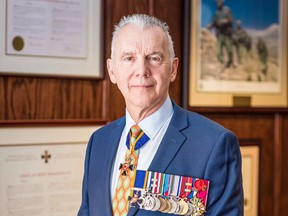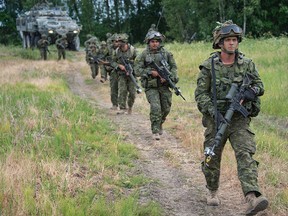How Canada Wins: ‘It’s good to serve your country. We’ve never pushed that to the extent that we should’
Article content
Back in the disco era, long before he became one of Canada’s top soldiers, Michel Maisonneuve was an exchange officer with a French regiment, based in Sedan, in the Ardennes.
Article content
Article content
The sister to his Valcartier-based armoured regiment, it was known, in French, as the 12th Hunters.
In those days — the late ’70s — the French had conscription: citizens were expected to serve a year.
Advertisement 2
Article content
“So, we used to pick up the young men and women who would arrive from civvy street with their long hair and everything, and look after them right from the beginning. And by the time we let them go after 12 months, I could have taken my troop to war I was so sure that they were well trained,” said the retired Canadian lieutenant-general, who served as assistant deputy chief of the defence staff.
It’s no secret that Canada’s military is having trouble recruiting people. At the end of 2024, the Canadian Armed Forces had 64,461 regular force members and about 23,177 reservists. It hopes to reach targets for the regular force (71,500) and the reserves (30,000) by 2032 to erase the current shortfall of about 13,862 people.
Maisonneuve believes fostering a sense of service among young Canadians could help the military’s recruitment efforts.
“It’s good to serve your country. It’s good to wear the Maple Leaf on your shoulder,” said the former general. “We’ve never pushed that to the extent that we should.”
He believes Canadians would come around to the idea of mandatory national service. The idea would be to make “good, ethical warriors — men and women who are prepared to defend our country and to fight for our values.”
Article content
Advertisement 3
Article content
Paul Mitchell, a professor at the Canadian Forces College in Toronto, said Finland and Singapore both do national service well.
“In both places, that service really reinforces a sense of national identity,” Mitchell said.
Both Maisonneuve and Mitchell said mandatory service shouldn’t be confined to military service, but said such a measure would go a long way to address the Forces’ recruitment issue.

Recruitment is not the only major challenge for the Canadian Armed Forces — procurement and culture are among the others — but the military’s top brass recognize the need for creative thinking as the world only gets more dangerous.
Lieutenant-General Steve Boivin, who heads Canadian Joint Operations Command, which is responsible for the planning, execution, support, and overall command of our deployed military operations at home and abroad, said his boss, General Jennie Carignan, Canada’s chief of the defence staff, has taken measures to bolster recruitment efforts.
The measures include “bringing people in faster, introducing a period of monitoring, then we’re looking at reviewing how we do background checks and security clearances, going digital versus analogue, because we have realized that the young people today in Canada, they want to serve … but they’re not going to wait for very long to get answers. They’ll move on to (other) opportunities much faster.”
Advertisement 4
Article content
Digitizing the recruiting process so people can apply online and making it easier to apply for security classification could help, he said. As could changing medical standards so people with attention deficit hyperactivity disorder or allergies can apply, Mitchell said.
“They’ve re-vamped all of that stuff; that’s going into place right now as we speak,” he said.
“This isn’t about lowering the standards. It’s basically recognizing that these things are prevalent within our society, that lots of people operate perfectly well them, and they don’t represent a risk to operational success.”
Mitchell said the potential talent pool has changed, and the military needs to adapt. Historically, it has recruited out of Atlantic and Western Canada, he said.
“These were men who were looking for a way to escape the rural life, escape the kind of tough jobs on fishing boats or in forestry or in agriculture, and see a little bit of the world and do something exciting,” he said.
“That labour pool has dried up long, long, long ago. We are now having to recruit from urban populations, much more multi-cultural, we’re trying to tap into women a lot more effectively.”
Advertisement 5
Article content
The idea is to “make the Forces a career destination for the people who, traditionally, have not looked at the Forces as a career,” Mitchell said.
That’s why some of the efforts at cultural change within the military “are really important for operational readiness,” he said.
“There are some people who say this comes at the expense of operational readiness. Every hour not spent on the firing range is a threat to operational readiness. But I continue to believe the Canadian Forces can walk and chew gum at the same time and understanding how to make this institution attractive to populations who, traditionally have not considered a career in the Canadian Forces, is an important operational function for our military to be engaged in right now.”
It’s good to serve your country. It’s good to wear the Maple Leaf on your shoulder
Problem is “if you want to celebrate Diwali, or you’re wearing a turban, you kind of start getting side eyes about different things and you may not necessarily feel like you are part of the team, or that your contributions to the team aren’t as valued as other people who are more recognizable to the military because there’s more of them,” Mitchell said.
Advertisement 6
Article content
“But those white guys with crew cuts aren’t joining up in the same numbers.”
It’s going to be hard to grow the Canadian Forces in today’s economy, he said.
“Quite honestly, if you’re looking at joining the army and you’re going to … be deployed to Petawawa, you’re going to be deployed to Wainwright or you’re going to be deployed to Shilo, these are not exactly cool destinations to go live in,” Mitchell said.
“Esquimalt might be pretty nice. Halifax is not too bad if you’re in the navy. But Cold Lake? It’s just this tiny little community and a lot of people are going to look at that and say, ‘I don’t want to live in Northern Alberta.’”
Maisonneuve applauded another innovation: the navy’s new program that allows people to try out being a sailor for a year, without longer commitments.
“I think it gets young men and women to try something different without feeling they have to make a life decision immediately,” he said.
The “primary value proposition” of the navy’s one-year program, “is an adventure,” is how Rear-Admiral Christopher Robinson assistant chief of naval staff, personnel and training, put it last year.
Advertisement 7
Article content
“It’s a chance to do something out of the ordinary.”
It “doesn’t hurt,” Robinson pointed out, “that you get paid for it as well. A sailor third class (the rank all participants hold in the program) in a year is going to make a little over $40,000.”
Maisonneuve said boosting military recruiting numbers will “require a whole-of-Canadian-society effort: governments at every level, from the PM on down, (will need) to value service to country; to business, to sports and entertainment, to communities … to push the honour of service. Better advertising, more recruiting centres (we got rid of many and went online) with a greater priority to recruiting and retention, including maybe using operational units to train new recruits.”
Boivin says the personnel shortfall is felt in the Canadian Forces “on a daily basis.”
“They have totally prioritized operations, and based on the current demand on the operational front, I can sustain it,” Boivin said. “If the demand increases, that’s where I get concerned because there is very little, if anything, left in terms of people power.”
Recommended from Editorial
Our website is the place for the latest breaking news, exclusive scoops, longreads and provocative commentary. Please bookmark nationalpost.com and sign up for our daily newsletter, Posted, here.
Article content









